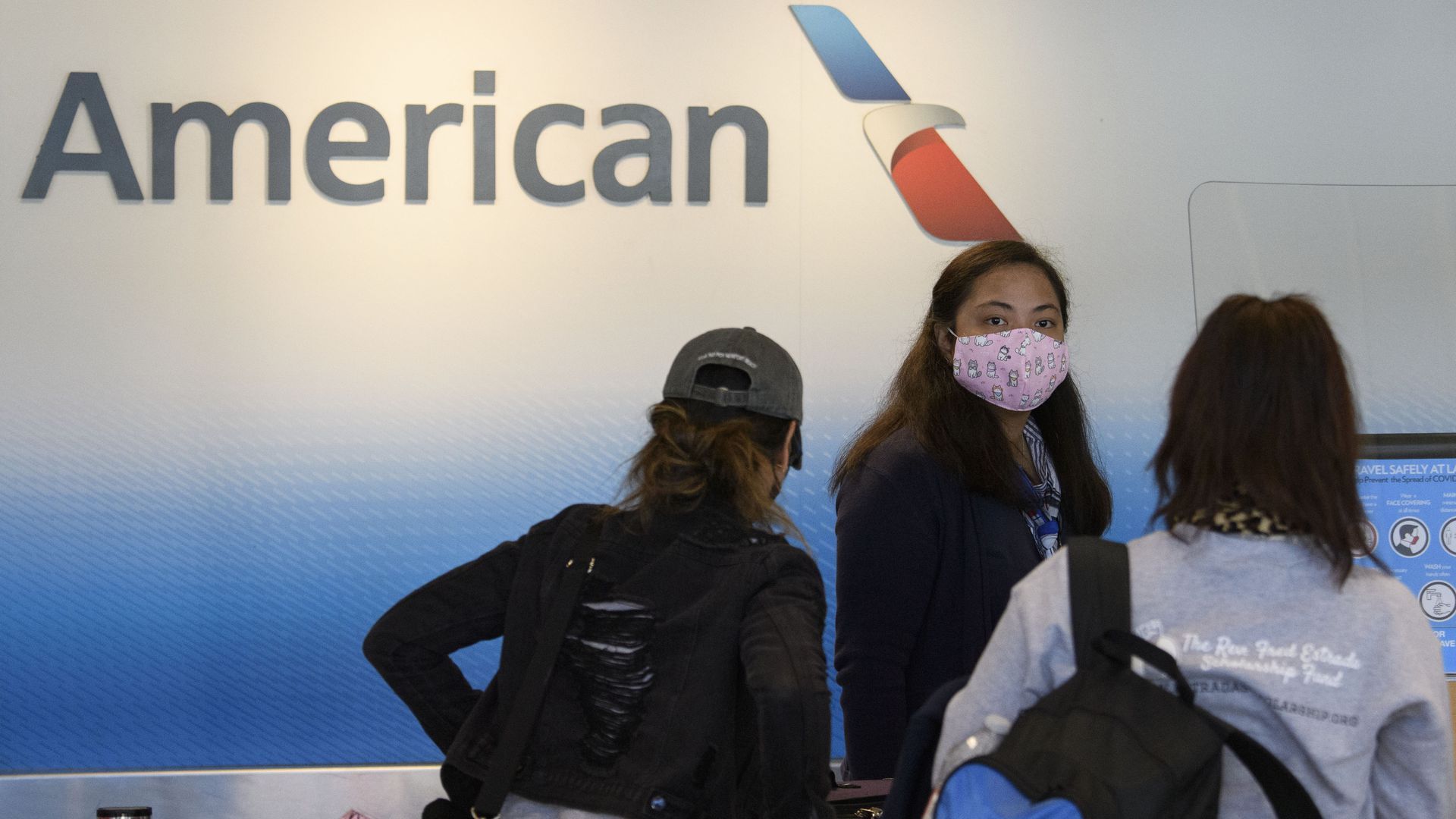| | | | | | | Presented By Northern Trust | | | | Axios Markets | | By Aja Whitaker-Moore ·Dec 22, 2020 | | Morning! I'm looking out for you while Dion is on vacation. Let me know how I'm doing at aja.moore@axios.com and follow me on Twitter @ajawmoore. If this email was forwarded to you, sign up here. (Today's Smart Brevity count: 1,090 words, 4 minutes.) 💻You're invited: Join Axios today at 12:30pm ET for a virtual event on housing inequities with former Secretary of Housing and Urban Development Julián Castro, Habitat for Humanity CEO Jonathan Reckford, National Fair Housing Alliance CEO Lisa Rice, and Capital One Head of Community Finance Desiree Francis. Register here. 🎙"Money don't matter 2 night. It sure didn't matter yesterday. Just when you think you've got more than enough, that's when it all up and flies away." | | | | | | 1 big thing: Tesla mania vs. economic reality |  Data: YCharts; Reproduced from Razum Capital; Chart: Axios Visuals Tesla is now more valuable than the combination of the world's top seven traditional automakers, despite only delivering half a million cars this year. Why it matters: Anyone searching for evidence that the stock market and the real economy are not the same thing, should look no further. - Tesla's frenzied ride in the capital markets culminated on Monday in the company being the largest entrant ever be included in the S&P 500, the main benchmark stock index.
Tesla's true believers are not paying for actual performance, but they are betting on Elon Musk as a visionary and the potential upside in the still nascent electric vehicle market. - The merits of that investment thesis diverge greatly from the current state of affairs in the automotive industry, and the broader economy.
Reality check: The overall equity market's meteoric rise in the face of a U.S. economy that will end 2020 3% smaller than it started the year, is just the latest example of the economic reality decoupling from stocks. - The equity market backdrop is a simple case of buyers needing to "invest in the market you have, and not the one that you want," says Quincy Krosby, chief market strategist for Prudential Financial.
- "It is a market that has been engineered by the liquidity of central banks. ... It is surprising how far we've come, and that includes Tesla," Krosby says.
Driving the news: While Tesla mania was once limited just to those who back Musk, after today anyone invested in an S&P index fund is essentially being forced along for the ride. - After months of anticipation and active buying, technical pressure pushed the stock down about 6% after its S&P 500 debut.
- That's happening alongside a broader market decline tied to a new wave of coronavirus concerns in the U.K.
What they're saying: "Tesla shares are in our view and by virtually every conventional metric not only overvalued, but dramatically so," wrote Ryan Brinkman, a JPMorgan analyst, in a research note. - In the past two years, Tesla's shares have risen more than 800% as analysts have increased average 12-month price targets more than fourfold and simultaneously lowered earnings per share estimates annually through 2024, Brinkman notes.
Yes, but: Tesla makes cars, but it could also be categorized alongside pure tech or electric vehicle companies. It is early in the "golden age of EV playing out globally," says Dan Ives, an analyst at Wedbush Securities. - Ives estimates that EV sales will grow from 3% of overall auto sales to 10% by 2025. "Many of the naysayers are probably the same individuals that thought LeBron wasn't going to be a good basketball player 15 years ago."
|     | | | | | | 2. Catch up quick | | Apple plans to make a self-driving passenger vehicle in 2024 using its battery technology. (Reuters) Peloton struck a $420 million deal to buy at-home fitness company Precor, a U.S. fitness-equipment maker that can manufacture equipment domestically. (Bloomberg) Russian hackers targeted the Treasury Department's senior leadership by using internal software keys to gaining access to the email system. (NYT) Ripple is expecting an SEC lawsuit over the sale of the cryptocurrency it created. (Axios) |     | | | | | | 3. U.S. trade deficits continue to grow |  Data: Census Bureau via FRED, BEA via FRED; Chart: Andrew Witherspoon/Axios The U.S. trade and current account deficits are at their deepest level since 2008, Axios' Felix Salmon writes. Why it matters: America's underwater trade position was one of the defining complaints of Donald Trump's 2016 presidential campaign, and the Trump administration has spent the past four years waging trade wars in a futile or even counterproductive attempt to turn it around. By the numbers: America's trade deficit was $63 billion in October, according to the Census Bureau, while the broader current account was in deficit to the tune of $179 billion in the third quarter, according to the Bureau of Economic Analysis. The big picture: The main reason for the weakness of the dollar is just that America is shipping a lot of money overseas to pay for goods and services from abroad. Meanwhile, the coronavirus has cratered demand from foreigners for everything from aircraft to American vacations. - Even after the coronavirus recedes, however, the weak dollar is probably here to stay. The main thing that would reverse the trend would be rate hikes from the Federal Reserve, and Fed chair Jay Powell has made it clear that's not going to happen in the foreseeable future.
|     | | | | | | A message from Northern Trust | | The wealth planning trifecta | | |  | | | | The trifecta of low interest rates, high exemption amounts and uncertain tax policy future make it a good time to revisit your wealth plan to prepare for an uncertain future. Learn how to take advantage of this window of opportunity from Northern Trust's The Wealth Planning Trifecta report. | | | | | | 4. Federal airline aid arrives amid fresh panic |  | | | An American Airlines agent checks in travelers during the Covid-19 pandemic at Los Angeles International Airport. Photo: Patrick Fallon/AFP via Getty Images | | | | Congress delivered an early Christmas gift to airlines just as another wave of travel restrictions is poised to dent the already battered industry. Why it matters: Airline workers again scored a special carve-out in Congress' latest coronavirus relief package by arguing that aviation — and the role airlines will play in delivering COVID-19 vaccines — is essential to the U.S. and its economy, Axios' Joann Muller reports. Driving the news: American Airlines and United Airlines said they would recall some 32,000 workers furloughed in October if a new round of federal aid was approved. Congress on Monday finally passed the $900 billion relief bill. Details: The package includes $15 billion for airlines to extend the payroll support program, which expired Sept. 30, plus $1 billion for related airline contractors. - In a letter to employees, American Airlines CEO Doug Parker said workers' pay and benefits would be retroactive to Dec. 1.
The catch: Restored jobs could only be temporary if air travel doesn't pick up again by March 31, when the renewed aid expires, warned United CEO Scott Kirby in a message to his employees. - "We don't expect customer demand to change much between now and the end of the first quarter of 2021," he wrote.
|     | | | | | | 5. Axios-Ipsos poll: Finally, some COVID optimism |  Data: Axios/Ipsos survey; Chart: Danielle Alberti/Axios One in three Americans believe their physical and mental health will be better next year as more people say they plan to get the COVID vaccine as soon as it's available, in the latest installment of the Axios/Ipsos Coronavirus Index. Why it matters: In a year of unrelenting bad news and doom, the survey finally shows some hints of optimism about the pandemic. By the numbers: Roughly a third of poll respondents said they expected 2021 to be better on several levels, including their physical health, their mental health, and their emotional well-being. Between the lines: The biggest sign of current stress is in personal finances: 76% said their finances are very or somewhat good, but 23% said their finances are very or somewhat poor. More Americans say they plan to get the vaccine as soon as it's available, continuing a trend we've seen as headlines about the vaccine rollout dominate the news. - Overall, 33% said they'll get the vaccine as soon as it's available, up from 27% last week.
Yes, but: Americans have grown more cautious about the holidays compared to our earlier surveys. For the first time, a majority — 53% — said they plan to celebrate at home with their immediate family, up from 46% two weeks ago. |     | | | | | | A message from Northern Trust | | How to relocate with taxes in mind | | |  | | | | Relocation is top-of-mind for many people this year because of potential tax savings and remote working becoming the norm. But before relocating, consider the broader impact of the move and understand the requirements to establish residency. The tax factors to consider. | | | | 🎙Quote: "Money don't matter 2 night. It sure didn't matter yesterday. Just when you think you've got more than enough, that's when it all up and flies away." Why it matters: Dion didn't exactly explain the rules to me. But when given the opportunity I will always quote the late Prince Rogers Nelson, singer-songwriter, producer, dancer, actor, and greatest musician of all time. 💜 Don't @ me about indisputable facts. See you here tomorrow! | | | | Axios thanks our partners for supporting our newsletters.
Sponsorship has no influence on editorial content. Axios, 3100 Clarendon Blvd, Suite 1300, Arlington VA 22201 | | | You received this email because you signed up for newsletters from Axios.
Change your preferences or unsubscribe here. | | | Was this email forwarded to you?
Sign up now to get Axios in your inbox. | | | | Follow Axios on social media:    | | | | | |








No comments:
Post a Comment